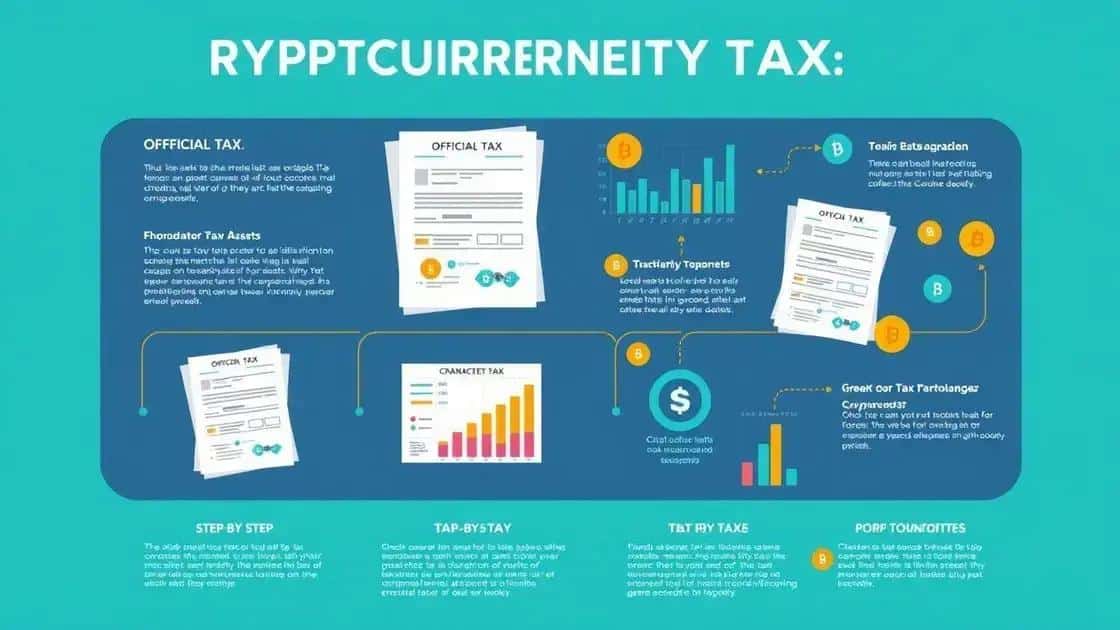Insights on cryptocurrency tax planning that can save you money

Effective cryptocurrency tax planning involves accurate record keeping, understanding common tax mistakes, utilizing tax-advantaged accounts, and staying informed about regulatory changes to maximize savings and ensure compliance.
Insights on cryptocurrency tax planning are essential as the digital currency landscape continues to evolve. As crypto investments grow, it’s crucial to understand how taxes impact your returns and what strategies can help you save money. Ready to explore the best approaches?
Understanding the Basics of Cryptocurrency Taxes
Understanding the basics of cryptocurrency taxes is essential for anyone involved in the digital currency market. As cryptocurrencies become more mainstream, knowing how to correctly report your earnings can save you from unexpected tax liabilities. This section will demystify cryptocurrency taxation and explain what you need to know.
What Are Cryptocurrency Taxes?
Cryptocurrency taxes are not as straightforward as traditional taxes. The IRS treats cryptocurrencies as property. This means that when you sell or trade your cryptocurrency, you may trigger a taxable event. Let’s look at some common scenarios:
- When you sell cryptocurrency for cash
- When you trade one cryptocurrency for another
- When you use cryptocurrency to purchase goods or services
It’s crucial to keep track of every transaction to ensure accurate reporting. Many people underestimate the importance of documentation in this process.
Why Is Tracking Important?
Accurate tracking helps you avoid fines and potential audits. The IRS expects you to track your capital gains and losses. If you fail to report your income accurately, you might face penalties. Even if you had losses, you can offset gains by reporting them correctly. Thus, effective tracking is a vital part of cryptocurrency tax planning.
Many platforms provide tools for tracking your cryptocurrency transactions. These tools can simplify the process, making it easier to report your gains or losses accurately.
In addition to capital gains and losses, different jurisdictions may also impose various taxes on cryptocurrency. Therefore, understanding your local laws is essential.
Knowing Your Tax Obligations
Every region has specific rules regarding cryptocurrency taxation. In the United States, for example, any profits from selling or trading cryptocurrencies are subject to capital gains tax. Understanding the rates and how they apply to your situation is crucial.
- Short-term capital gains: Typically taxed at ordinary income rates.
- Long-term capital gains: Generally taxed at lower rates.
- Potential tax implications of mining if applicable.
Overall, staying informed about your tax obligations can significantly impact your financial situation. If you’re ever unsure, consulting with a tax professional can provide clarity.
By understanding the basics of cryptocurrency taxes, you set a solid foundation for your investment strategy. This knowledge empowers you to take control of your finances in the fast-evolving world of digital currencies.
Common Tax Mistakes to Avoid

Avoiding common tax mistakes is crucial for anyone involved in cryptocurrency. Many investors can easily overlook important details that may lead to higher taxes or penalties. By recognizing these pitfalls, you can protect your investments and ensure compliant reporting.
Failing to Track Transactions
One of the biggest mistakes is not keeping accurate records of your cryptocurrency transactions. Every buy, sell, and trade should be documented. This documentation is essential because:
- It helps calculate capital gains and losses.
- Ensures compliance with tax regulations.
- Prevents issues during an audit.
Without proper tracking, you risk underreporting your income, which could lead to severe penalties.
Ignoring Taxable Events
Another frequent mistake is ignoring what constitutes a taxable event. Many investors think they only owe taxes when they cash out their cryptocurrency, but this is not the case. Any of the following activities can create tax obligations:
- Trading one cryptocurrency for another.
- Using cryptocurrency to purchase goods or services.
- Receiving cryptocurrency as income.
Being unaware of these events can lead to unexpected liabilities. It’s vital to stay informed.
Not Reporting Losses
Many people don’t realize that capital losses can be reported for tax benefits. If you’ve experienced losses in your investments, you can offset those against your gains to reduce your taxable income. However, failing to report these losses means missing out on potential savings.
Another common error is thinking that losses are lost forever. You can carry over unused losses to future tax years, allowing you more flexibility in planning. You need to be aware of the rules that apply to your situation.
By being diligent and aware of these mistakes, you can effectively manage your tax obligations in the cryptocurrency space. Remember to stay updated with any changes in tax laws, as this area is constantly evolving.
Effective Strategies for Tax Planning
Effective strategies for tax planning can significantly impact your financial outcomes in the cryptocurrency world. By implementing the right approaches, you can maximize your profits while ensuring compliance with tax regulations.
Start with Accurate Record Keeping
One of the most effective strategies is maintaining meticulous records of all your cryptocurrency transactions. By keeping track of:
- Dates of transactions
- Amounts spent or received
- Transaction types
- Current market values at the time of transaction
Having organized records simplifies the reporting process and helps compute gains or losses accurately. It reduces the risk of errors and potential audits.
Consider Long-Term Investments
Investing in cryptocurrencies with a long-term perspective can also be a strong strategy. Long-term capital gains are typically taxed at a lower rate than short-term gains. This means holding onto your assets for more than a year can potentially save you money. Additionally, this approach allows you to ride out marketplace volatility, leading to better overall returns.
By adopting a long-term strategy, you shift focus from short-term price fluctuations to overall growth potential. In a time of uncertainty, patience may be your best ally.
Use Tax-Advantaged Accounts
Another effective strategy involves using tax-advantaged accounts like IRAs and 401(k)s for your cryptocurrency investments. By leveraging these accounts, you can:
- Defer taxes on gains until withdrawal.
- Possibly lower your overall tax bracket.
- Benefit from tax-free growth while your assets appreciate.
This approach to tax planning can lead to substantial savings over time.
Understanding the specifics of these accounts is essential, as rules often vary between different types of accounts. Consulting a financial professional can help clarify the best options for your situation.
Stay Updated on Regulations
Tax regulations around cryptocurrency are rapidly changing. Staying informed about the latest rules and updates is key to effective tax planning. By keeping up with changes, you can adapt your strategies accordingly and avoid missteps that could lead to unintended tax liabilities.
This can involve regularly checking trusted news sources, IRS updates, or even joining cryptocurrency tax forums where experienced users share insights. Engaging with others in the community can provide valuable information that enhances your tax planning strategies.
Implementing these effective strategies for tax planning can lead to better financial outcomes while ensuring compliance. As cryptocurrency evolves, maintaining a proactive approach will help you navigate the complexities of taxation successfully.
Resources for Staying Updated on Cryptocurrency Regulations

Staying updated on cryptocurrency regulations is essential for investors and traders. The landscape is always changing, so having reliable resources can help you navigate the complex world of crypto taxes.
Government Websites
One of the best sources for information is official government websites. For example, the IRS provides guidelines on how cryptocurrencies are treated for tax purposes. Regularly checking these sites ensures you have firsthand information.
- IRS website: Offers guidance on cryptocurrency transactions.
- SEC website: Covers regulations concerning initial coin offerings (ICOs).
- Local government tax departments: Often publish state-specific rules.
Using these sources keeps you informed about any changes or updates to the law.
Crypto News Platforms
Following reputable cryptocurrency news platforms is another effective way to gain insights into regulations. These platforms often summarize developments in the industry and provide expert analyses. Popular sites include:
- CoinDesk
- CoinTelegraph
- The Block
By subscribing to their newsletters or following them on social media, you can ensure you are always in the loop.
Online Communities and Forums
Engaging in online communities can also be beneficial. Platforms like Reddit and specialized forums allow users to share their knowledge and experiences regarding cryptocurrency regulations. Participating in these discussions provides valuable insights from others who have faced similar challenges. Additionally, platforms like Telegram and Discord often have groups focused on cryptocurrency where regulatory updates are shared almost in real time.
These peer-to-peer exchanges can be incredibly helpful, especially for newcomers.
Professional Services
Lastly, consider consulting with professional services. Tax advisors with expertise in cryptocurrency can offer tailored advice based on your personal investment. Keeping a close relationship with a tax professional ensures you stay compliant with evolving regulations.
Leveraging these resources can put you ahead in the fast-paced world of cryptocurrency. By staying informed, you can make better financial decisions while minimizing risks associated with tax reporting and compliance.
In conclusion, understanding cryptocurrency tax planning is essential for maximizing your returns and avoiding pitfalls. By staying informed about regulations and implementing effective tax strategies, you can ensure compliance while potentially saving money. Keeping accurate records, being aware of common mistakes, and utilizing available resources will put you on the right path. Remember, in the fast-paced world of cryptocurrency, knowledge is your best asset.
FAQ – Common Questions about Cryptocurrency Tax Planning
Why is accurate record keeping important for cryptocurrency taxes?
Accurate record keeping is crucial to calculate your capital gains and losses correctly, ensuring compliance with tax regulations.
What are the common mistakes to avoid in cryptocurrency tax reporting?
Common mistakes include failing to track transactions, ignoring taxable events, and not reporting capital losses, which can lead to penalties.
How can I stay updated on cryptocurrency regulations?
You can stay updated by following official government websites, reputable news platforms, and engaging in online communities discussing cryptocurrency.
Should I consult a tax professional for cryptocurrency investments?
Yes, consulting a tax professional can provide personalized guidance and help you navigate the complexities of cryptocurrency tax planning.






